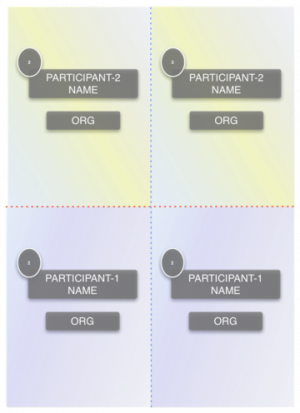SdNOG:Badges and Lanyards
Contents
Introduction
One of the most time consuming items at any event is the preparation of attendee badges. While SdNOG is in its infancy, we do not have facilities to to on-demand printing. Additionally, as this is a manual process, it's desirable to minimise the time spent on the time from badge creation, to insertion into the badge pouch, while maintaining a badge that is useful enough to both participants and sponsors.
Badges
Badges will be double-printed; ie. the participant, affiliation, and sponsor details will appear on both the front and the back of the badge. The badge will need to be cut (likely horizontally, depicted in the picture as a red line), and then folded once vertically (along the blue line). Two complete badges should be produced per single A4 sheet.
It's desirable that the badge be large enough to clearly show essential information being:
- name of participant (large and clear text)
- organisation (smaller than name)
- affiliation (sponsor / speaker / etc - possibly at a later stage)
Additionally, to show participation in side events like PGP signing parties, it is also desirable for the badge (and pouch) to have space to allow the participant to affix markers of their choice. Since SdNOG-2, the following markers/stickers have been used:
- red : SdNOG management committee
- green : sponsor
- yellow : speaker
- blue: willing to sign PGP keys.
Badge Pouches
The badge pouch will house the participant badges. Since SdNOG-2, the SdNOG meeting team has standardised on size A6 (105mm × 148mm) as the badge size, thus the badge pouch should be able to accommodate this size. The badge pouches are supplied by Promotag, in Johannesburg.
As the meeting increases in scope, this may change to house a printed copy of the meeting agenda.
Lanyards
The lanyard has been identified as a cheap, and effective marketing element for SdNOG. While the lanyards from SdNOG-1 were widely used at the event, it has been noted that there is little re-use after the event because the lanyards were printed on white tape, and presumably, got dirty quickly. Since SdNOG-2, SdNOG lanyards are no longer printed on plain white tape, to encourage maximum re-use after the event.
Additionally, the lanyards used at SdNOG-2 were woven, as opposed to silk-screen printed, so that they would last longer, and survive washing. The lanyards at SdNOG-2 were supplied by Promotag, in Johannesburg, and paid for by an anonymous donor.
